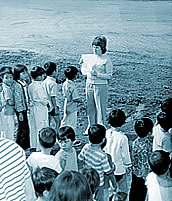|
Continued from page 1
ESL and Bilingual Education
In response to the large waves of refugee resettlement in the late 1970s and early
1980s, curricular resources were developed for ESL (English as a Second Language)
and bilingual educational programs in some school districts throughout the U.S.
Resources for teacher professional development were also produced during this
period, particularly those focused on helping teachers understand the diverse
cultures of Southeast Asian children and their families. Other resources were
developed to support Southeast Asian American parents’ involvement in schools.
The Need for Teachers
Some Southeast Asian American bilingual teachers and paraprofessional staff have
been hired, especially as support staff. Unfortunately, there is still a paucity
of Southeast Asian Americans in the teaching profession, and more efforts are
needed to hire lead teachers in districts with high concentrations of Southeast
Asian Americans. Professional associations such as the National Association for
the Education and Advancement of Cambodian, Laotian and Vietnamese Americans (NAFEA)
were established to assist professionals working in both K-12 and higher education.


|


